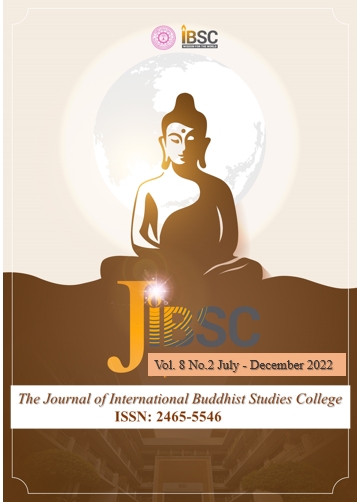Buddhist Mindfulness Meditation Application for the Benefit of Mankind Satipaṭṭhānasutta
Main Article Content
Abstract
This study aims to conduct a thorough analysis of the literature pertaining to the Buddhist tradition of mindfulness meditation and its utilization in scientific research. The primary goals encompass three aspects: firstly, to assess the existing literature on the core principles, historical development, and philosophical foundations of Buddhist mindfulness meditation; secondly, to explore the increasing body of literature investigating the amalgamation of Buddhist mindfulness meditation techniques with scientific methodologies, particularly in the realms of psychology, neuroscience, and medicine; and thirdly, to amalgamate the results from the objectives to present a comprehensive comprehension of the possible implications and advantages of mindfulness meditation for individuals and society as a whole. Examined 83 clinical research studies to investigate their objectives, methodologies, and outcomes, followed by an analysis and synthesis revealing that mindfulness has the capacity to enhance the well-being of humanity, encompassing both physical and mental health.
The results suggest that mindfulness practices within the Theravāda Buddhist tradition produce two distinct results: Lokiya Sukha (worldly benefits), which encompasses benefits in the worldly sphere, and Lokuttara Sukha (benefit beyond the world), which signifies benefits beyond the ordinary realm. Nevertheless, in scientific settings where mindfulness meditation is employed, the emphasis tends to be on Lokiya Sukha due to its direct observability, measurability, and controllability in research environments. This focus highlights the pragmatic and quantifiable advantages of mindfulness practices in improving well-being and addressing various psychological and physiological aspects. Despite this divergence in
focus, the shared benefits arising from Buddhist mindfulness meditation underscore its universal effectiveness and significance for humanity. By uniting ancient wisdom with modern scientific investigation, mindfulness meditation demonstrates its capacity to reduce suffering, nurture resilience, and promote comprehensive well-being for individuals and communities globally. Hence, this study reaffirms the substantial and concrete advantages of mindfulness meditation, affirming its importance for the advancement of humanity.
Article Details
The Journal of TCI is licensed under a Creative Commons Attribution-NonCommercial-NoDerivatives 4.0 International (CC BY-NC-ND 4.0) licence unless otherwise stated. Please read our Policies page for more information on Open Access, copyright and permissions.
References
Vesilind, P. Aarne, ed. Peace engineering: when personal values and engineering careers converge. Lakeshore Press, 2014.
Phra Brahmagunabhorn (P.A. Payutto). Buddhadhamma Expanded Volume. Bangkok: Sahadhammik Press, 2016.
Incerti-Théry, Irene. “Dialogue as a tool in peacebuilding. Theoretical and empirical perspectives.” Master’s thesis, UiT Norges arktiske universitet, 2016.
John Rawls. A Theory of Justice. (revised ed.), Oxford: Oxford University Press, 1999.
Nickel, James. Human Rights‖ Stanford Encyclopedia of Philosophy. Stanford University, 2009.
Webel, Charles, and Johan Galtung, eds. Handbook of peace and conflict studies. Vol. 7. London: Routledge, 2007.
John Rawls. A Theory of Justice. Oxford: Oxford University Press., 1999.
Galtung, Johan. “Violence, peace and peace research.” Organicom. Vol.15, No. 28 (2018): 33-56.
Curriculum Doctor of Philosophy Program in Peace Studies (International Program) New Curriculum 2017.
John Rawls, A Theory of Justice (revised ed, Oxford: Oxford University Press, 1999),
General information. https://www.ibsc.mcu.ac.th/ (accessed on 14 February 2021)
“Admission”, on online. https://www.ibsc.mcu.ac.th/, (accessed on 14 February 2021)
Curriculum Doctor of Philosophy Program in Peace Studies (International Program) New Curriculum 2017:
Peace, dignity and equality on a healthy planet. https://www.un.org/en/ (accessed on 10 August 2021)
Nick Morgan. We Humans Are Social Beings - And Why That Matters For Speakersand Leaders. Forbes, https://www.forbes.com/sites/nickm organ/2015/09/01/we-humans-are-social-beings-and-why-that-matters for-speakers-andleaders/#68e0b05c6abd (accessed August 11, 2020).
Concept of peace. http://www.uop.edu.pk/ocontents/concept (accessed on 20 August 2021)
Information UNESCO. https://en.unesco.org/70years/building_peace. On online (accessed on 24th June 2021)
Ebieri Favour, Amnesty Basic Definition of Human Rights. Amnesty International. http://www.amnestyusa.org/research/human-rights-basics. (accessed on June 27 August 2021)
“Information”, on online, http://www.un.org/en/documents/charter/preamble .shtml, (accessed on 27 October 2021)


